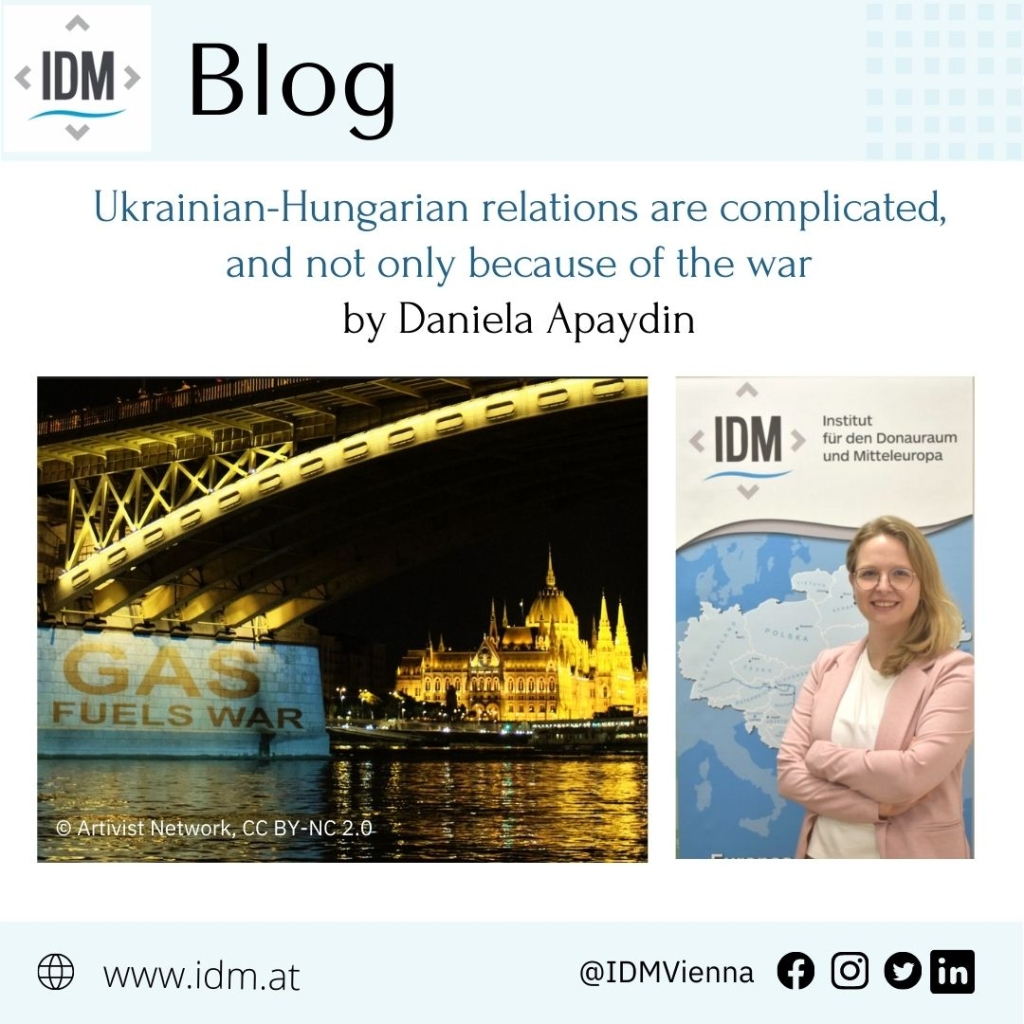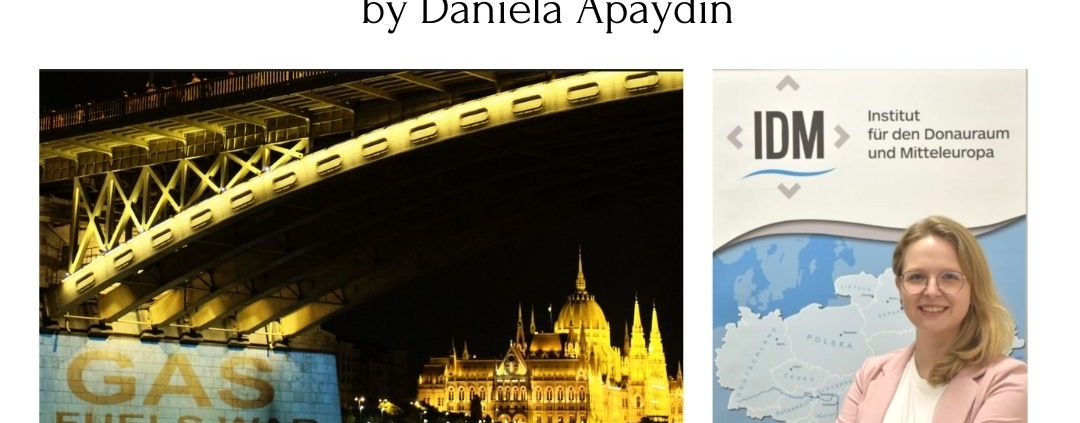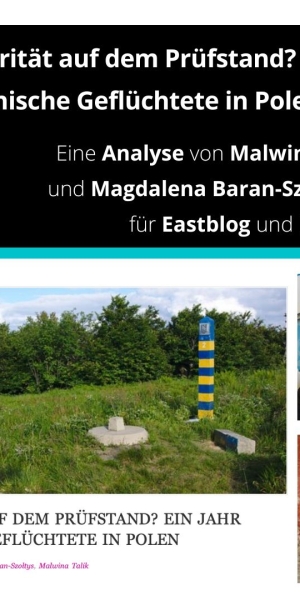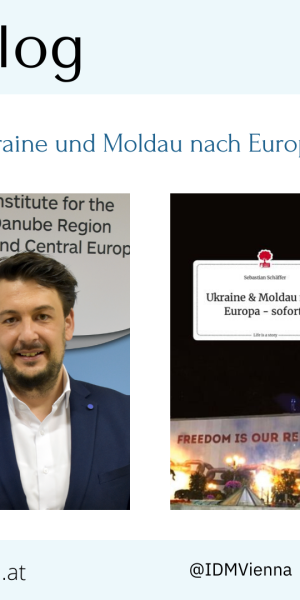Ukrainian-Hungarian relations are complicated, and not only because of the war

In her article for the IDM Blog Daniela Apaydin explains the context and the reasons behind the rhetoric skirmishes between Kyiv and Budapest.
In January the mayor of the Ukrainian city of Dnipro Boris Filatov, called Viktor Orbán a bitch-face. Before that statement hit the headlines of Hungarian media, the prime minister was quoted by reporters saying that Ukraine was a no man’s land comparable to Afghanistan. As a result, the Hungarian ambassador was summoned to Kyiv and diplomatic relations between the two neighbouring countries have sunk to a new low.
What is going on between Kyiv and Budapest? Do we even need to bother about Hungary’s position in the war at all?
First, let us not get focused on the clash of words between two alpha males and interpret it with the effects of toxic masculinity on politics. I suggest looking at the stories behind this dispute to learn about what is going on in Budapest.
One of these stories starts with the question: Why does Orbán provoke Ukraine and its political leadership while he pretends to be neutral? The simple answer is that Orbán’s position in this war is not neutral at all (Read the author’s analysis of Russia’s role in the Hungarian elections in 2022).
The context of Orbán’s statements always matter. In this case, he met mainly conservative reporters in a closed-door meeting. One of them was Rod Dreher from the US, an Orthodox Christian and author of books such as “The Benedict Option: A Strategy for Christians in a Post-Christian Nation”. Dreher spent last summer in Budapest as a visiting fellow at the Danube Institute, a right-wing think tank with close ties to Fidesz. After the meeting, Dreher wrote a comprehensive report for “The American Conservative” in which he praised the intellectual skills of Orbán, saying “the man is deep. He thinks hard about this stuff, at the level of grand strategies and principles”.
In his article, Dreher repeats the statements by Orbán about the war in Ukraine. Content-wise this was nothing new to observers, yet the clarity of the message is intriguing. According to them, Ukraine has lost the war anyway. Russia is too strong and influential. Let us not waste any further energy on this war and let us exploit current tensions for capitalizing nationalist politics. Calling Ukraine a no-man’s land echoes well among right-wing conservative circles with little knowledge of the region and its history. It also fits to Orbán’s image in these circles as a courageous statesman and pragmatic politician who knows what is best for his nation and acts accordingly. Similar reactions came from Austria, where the controversial platform “exxpress” covered the meeting with Orbán in Budapest. In times when old alliances (such as Poland) have been frozen due to opposing positions on the war, Orbán regularly reaches out to his transatlantic allies.
If you followed Orbán’s annual State of the Nation speech on February 18, you heard a slightly different tone from the prime minister. Russia’s military power would not be ready to attack a NATO member in the near future, Orbán stated. His assessment of Russia’s power in a closed-door meeting with US reporters differs from his State of the Nation speech. However, the consequence of holding on to the “Hungary first” approach, remains the same: “This is not our war”, said the prime minister once again. “It would not be morally right to put the interests of Ukraine before those of Hungary.”
Central European entanglements
The second story behind this dispute between Ukraine and Hungary traces its roots back into Central European history. Dnipro’s mayor argued that “it takes a special talent to be hated everywhere from Romania and Slovakia to Serbia and Ukraine. The Treaty of Trianon is, after all, a punishment for your historical meanness.” Filatov’s choice of words is apparently due to an emotional, exceptional situation during war. The reference to Trianon, however, sheds light on an unresolved Central European issue between Hungary and Ukraine that stems from a long time before the Russian invasion of Ukraine in 2022. The role of minorities in the region is often neglected by western observers when analyzing current conflicts. Yet the threats of the war experienced by the Hungarian minority in the Transcarpathian region poses a real challenge to Orbán’s narrative of staying out for the sake of Hungarians. In his State of the Nation speech the prime minister only shortly addressed the Hungarians in Ukraine by emphasizing their heroic sacrifices on the frontline.
Hungary first, yes, but in corruption
Finally, the recent rhetorical clashes should be seen in the media’s tendency to focus on outrage while missing the actual scandals: in February, Hungary was ranked further down by Transparency International and is seen as the most corrupt country in the EU. Inflation in Hungary is at an historic peak and severely threatens economic stability. Furthermore, the fight between the Commission and EU treaties and the government in Budapest has once more picked up speed as millions in Erasmus funds have been frozen – with tremendous risks not only for students and academia, but also for the stability of the government’s tribalist system of distributing (EU) money among its allies in business.
Summing up, for some the recent clash of alpha males might be an entertaining headline. Others prefer focusing on the stories behind rhetorical escalations. Orbán’s ongoing balancing act of Hungary’s foreign policy – between the fact that the country is a member of the EU and NATO and its reluctance to stop spreading Kremlin propaganda and keeping strong economic ties with Russia – will drive the country even further away from those who demand a clear stand on the war. Orbán is convinced that he is representing the interest of the nation, yet it is questionable if he honestly considers Hungarians in Ukraine as actually part of this nation. It is certainly not in their interest if their home country becomes a no-man’s land.
The prime minister’s arrangement with Putin puts the country into the position of the Kremlin’s puppet within the EU. Connoisseurs of history know that such loyalties are fragile and that the stronger partner can easily cut ties once they are no longer useful to him. In the case of Hungary, sooner or later the country might have to come back for support from Brussels, Warsaw, or Bratislava. Perhaps then, Orbán’s EU bashing and lack of solidarity towards his neighbors could easily backfire. Ultimately, future crises demand strong alliances in the region, by which time nationalists in the US might have long since forgotten their praised statesman in Budapest.



